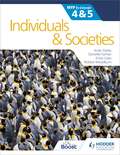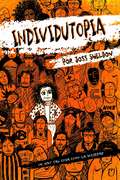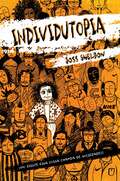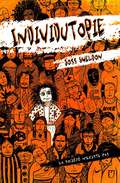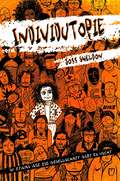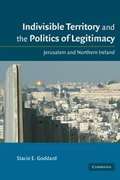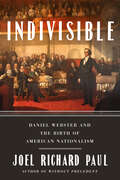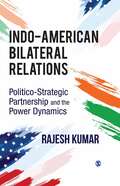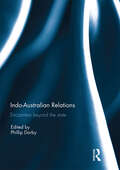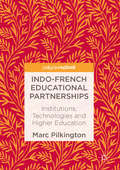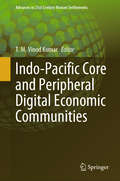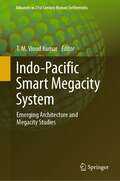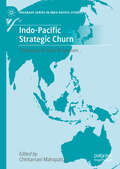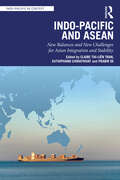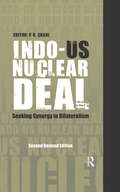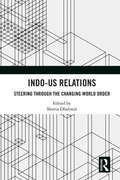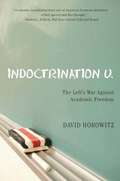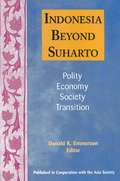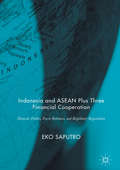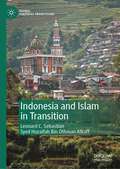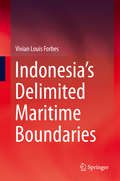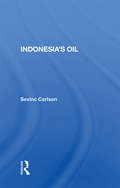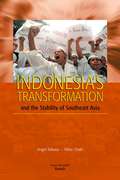- Table View
- List View
Individuals and Societies for the IB MYP 4&5: MYP by Concept
by Danielle Farmer Emily Giles Kenneth A Dailey Robbie WoodburnDevelop your skills to become an inquiring learner; ensure you navigate the MYP framework with confidence using a concept-driven and assessment-focused approach to Individuals and societies, presented in global contexts.· Develop conceptual understanding with key MYP concepts and related concepts at the heart of each chapter. · Learn by asking questions for a statement of inquiry in each chapter. · Prepare for every aspect of assessment using support and tasks designed by experienced educators.· Understand how to extend your learning through research projects and interdisciplinary opportunities.· Think internationally with chapters and concepts set in global contexts.
Individuals and Societies for the IB MYP 4&5: MYP by Concept
by Danielle Farmer Emily Giles Kenneth A Dailey Robbie WoodburnDevelop your skills to become an inquiring learner; ensure you navigate the MYP framework with confidence using a concept-driven and assessment-focused approach to Individuals and societies, presented in global contexts.· Develop conceptual understanding with key MYP concepts and related concepts at the heart of each chapter. · Learn by asking questions for a statement of inquiry in each chapter. · Prepare for every aspect of assessment using support and tasks designed by experienced educators.· Understand how to extend your learning through research projects and interdisciplinary opportunities.· Think internationally with chapters and concepts set in global contexts.
Individutopia
by Joss SheldonEL AUTOR DE BEST SELLERS # 1 HA REGRESADO CON UN CLÁSICO ORWELLIANO ... Descarga tu copia de la radical novela de Joss Sheldon hoy mismo. Estimado amigo, Es el año de 2084, y aquella famosa cita de Margaret Thatcher se ha convertido en una realidad: realmente no existe tal cosa como la sociedad. Nadie le habla a nadie más. Nadie mira a nadie más. Las personas no colaboran, solo compiten. Odio admitirlo, pero esto ha tenido consecuencias trágicas. Incapaz de satisfacer sus necesidades sociales, la población ha caído en un pozo de depresión y ansiedad. El suicidio se ha convertido en la norma. Todo suena bastante morboso, ¿no es así? Pero, por favor, no te desesperes, hay esperanza, y se presenta en la forma de nuestra heroína: Renee Ann Blanca. Deseando llenar el hueco con forma de sociedad en su vida, nuestra Renee hace lo impensable: ¡sale en busca de compañía humana! Es un acto radical y un desafío enorme. Pero eso, supongo, es la razón por la que vale la pena contar su historia. Es tan emocionante como conmovedora, y creo que te va a encantar. ... Tu narrador de confianza, PP Perfecto para los fanáticos de "1984" y "Un mundo feliz". No tan bueno para los neoliberales ... Elogios a las novelas de Sheldon: "Radical ... una obra magistral ... de primera clase ..." – The Canary "Más oscuro que el 1984 de George Orwell" - AXS "Magnífica" - Global Education Network "Una hazaña realmente notable" - BuzzFeed "Sincera e inquietante" - Free Tibet "Impresionante" - The Huffington Post "Picaresca" - Scottish Left Review "Imposible de dejar de leer" – The Avenger "Brillante" - Middle East Monitor "Extrañamente confortante" - The Tribune ¡¡¡DESCARGA UNA COPIA HOY MISMO!!!
Individutopia: A Novel Set In A Neoliberal Dystopia
by Joss SheldonUm romance ambientado em uma sombria distopia neoliberal em que as grandes corporações reinam absolutas, o individualismo extremo triunfou e o conceito de sociedade não existe.
Individutopie
by Joss SheldonL’auteur de best-sellers revient avec un classique orwellien… Obtenez sans plus attendre un exemplaire du roman radical de Joss Sheldon. Cher ami, Nous sommes en 2084 et la célèbre citation de Margaret Thatcher est devenue réalité : la société n’existe plus. Personne ne se parle. Personne ne se regarde. Les gens ne collaborent plus, ils rivalisent. Je déteste le reconnaître, mais les conséquences ont été tragiques. Incapable de satisfaire ses besoins sociaux, la population a sombré dans un gouffre de dépression et d’anxiété. Le suicide est devenu la norme. Tout cela vous paraît assez morbide, n’est-ce pas ? Mais je vous en prie, ne désespérez pas. Il y a de l’espoir, et celui-ci porte le nom de notre héroïne : Renée Ann Blanca. Souhaitant combler le vide affectif dans sa vie, notre Renée va faire l’impensable : se mettre en quête de compagnie humaine ! C’est un acte radical et un défi de taille. Mais c’est, j’imagine, pourquoi son histoire vaut la peine d’être narrée. Elle est aussi captivante que touchante, et je pense que vous allez l’adorer… Votre fidèle narrateur, PP Parfait pour les amateurs de 1984 et Le meilleur des mondes. Pas trop pour les néolibéraux… Critiques des romans de Sheldon : •« Radical… Iconique… Excellentissime… » - The Canary •« Plus sombre que 1984 de George Orwell » - AXS •« Fantastique » - Global Education Network •« Une prouesse assez remarquable » - BuzzFeed •« Sincère et inquiétant » - Free Tibet •« Époustouflant » - The Huffington Post •« Picaresque » - Scottish Left Review •« Impossible à lâcher » - The Avenger •« Génial » - Middle East Monitor •« Étrangement chaleureux » - The Tribune
Individutopie: So etwas wie die Gesellschaft gibt es nicht.
by Joss SheldonWir schreiben das Jahr 2084 und Margaret Thatchers berühmtes Zitat ist Wirklichkeit geworden: So etwas wie die Gesellschaft gibt es nicht. Die Leute sprechen nicht mehr miteinander. Sie sehen sich nicht mehr gegenseitig an. Die Menschen arbeiten nicht mehr zusammen, sie konkurrieren bloß noch. Es schmerzt mich das zugeben zu müssen, aber dies hatte tragische Konsequenzen. Da die Bevölkerung nicht mehr dazu in der Lage war, ihre sozialen Bedürfnisse zu befriedigen, ist sie Depressionen und Beklemmungsgefühlen anheimgefallen. Selbstmord ist zur Norm geworden. Das alles klingt ziemlich morbide, nicht wahr? Aber verzagen Sie nicht, denn es gibt Hoffnung, die in Form unserer Heldin daher kommt: Renee Ann Blanca. Da sie etwas gegen den fehlenden sozialen Kontakt in ihrem Leben unternehmen will, tut sie das Undenkbare: Sie macht sich auf die Suche nach menschlicher Gesellschaft! Eine radikale Tat und eine enorme Herausforderung. Aber ich schätze, das ist der Grund, warum es sich lohnt ihre Geschichte zu erzählen. Sie ist packend und ergreifend zugleich und ich glaube, Sie werden sie lieben…
Indivisible Territory and the Politics of Legitimacy
by Stacie E. GoddardIn Jerusalem and Northern Ireland, territorial disputes have often seemed indivisible, unable to be solved through negotiation, and prone to violence and war.
Indivisible: Daniel Webster and the Birth of American Nationalism
by Joel Richard PaulThe story of how Daniel Webster popularized the ideals of American nationalism that helped forge our nation&’s identity and inspire Abraham Lincoln to preserve the Union When the United States was founded in 1776, its citizens didn&’t think of themselves as &“Americans.&” They were New Yorkers or Virginians or Pennsylvanians. It was decades later that the seeds of American nationalism—identifying with one&’s own nation and supporting its broader interests—began to take root. But what kind of nationalism should Americans embrace? The state-focused and racist nationalism of Thomas Jefferson and Andrew Jackson? Or the belief that the U.S. Constitution made all Americans one nation, indivisible, which Daniel Webster and others espoused? In Indivisible, historian and law professor Joel Richard Paul tells the fascinating story of how Webster, a young New Hampshire attorney turned politician, rose to national prominence through his powerful oratory and unwavering belief in the United States and captured the national imagination. In his speeches, on the floors of the House and Senate, in court, and as Secretary of State, Webster argued that the Constitution was not a compact made by states but an expression of the will of all Americans. As the greatest orator of his age, Webster saw his speeches and writings published widely, and his stirring rhetoric convinced Americans to see themselves differently, as a nation bound together by a government of laws, not parochial interests. As these ideas took root, they influenced future leaders, among them Abraham Lincoln, who drew on them to hold the nation together during the Civil War. As he did in Without Precedent and Unlikely Allies, Joel Richard Paul has written in Indivisible both a compelling history and a fascinating account of one of the founders of our national perspective.
Indo-American Bilateral Relations: Politico-Strategic Partnership and the Power Dynamics
by Rajesh KumarIndo-American Bilateral Relations studies the politico-strategic relations between India and the USA from the early years of India’s independence to the present times. The book talks about the various phases of tension and cooperation between the two powers and focuses on the changes that have taken place under various governments. The book examines the nature and character of strategic issues that have led these countries towards being called ‘Natural Allies’, including contemporary issues, such as nuclear and energy security, which dominate bilateral relations between the two. It analyses the nature and extent of defence cooperation and the reasons inhibiting cooperation beyond joint military exercises. The work is a thorough analysis of past and present events that have shaped and are shaping relations between the two countries and a look at what the future may hold.
Indo-Australian Relations: Encounters beyond the State
by Phillip DarbyThis book explores a range of connections between India and Australia that fall outside the formal diplomacy of the two states. It examines how race, class and gender shape conceptions of the two nations, whose voices are heard and whose are not, and the politics that emerge from sport, culture, the drive for development as well as from language and the poetic. The book seeks to challenge the primacy of the state in determining the character of the nation and its monopoly of relations with other peoples. To this end, it looks to everyday life to find linkages not only between India and Australia but also extending through the South and Southeast Asian regions.This book was published as a special issue of Postcolonial Studies.
Indo-French Educational Partnerships
by Marc PilkingtonThis book examines the unexpected convergence between the higher education systems of India and France. This has resulted due to links between higher education investment and economic growth in the light of the knowledge triangle and the Lisbon strategy, which has recently been replaced by the Horizon 2020 scheme. The current state of Indo-French cooperation is highlighted and it is suggested that the prospective Indo-French knowledge management system will provide a competitive advantage in the contemporary knowledge economy.
Indo-Pacific Core and Peripheral Digital Economic Communities (Advances in 21st Century Human Settlements)
by T. M. Vinod KumarThis book demonstrates to the world by a series of replicable case studies, how the Indo-Pacific developmental initiatives of QUAD, France, Germany, the Netherlands, Canada, the European Union, Japan, Australia, and others can be implemented using the design of “Core Digital Economic Communities” within the 21 megacities that form Indo pacific megacity system and outside with independent country strategies to engage with these megacity systems where “Peripheral Digital Economic Communities” are located.
Indo-Pacific Smart Megacity System: Emerging Architecture and Megacity Studies (Advances in 21st Century Human Settlements)
by T. M. Vinod KumarThis book is an in-depth study of the Indo-Pacific region for effective interventions in the megacities system. First, based on several criteria, the region is identified as homogeneous country groupings of diversity, a multi-polar spatial system, and as program regions of QUAD and I2U2 for action programs and investment transcending many nations but mostly the ocean space of the Indo-Pacific, connecting all megacities sub-regions spatially and functionally. Then, the megacities with problems and prospects for economic integration are studied from the point of view of regional economics and international trade, and finally, the rural–urban interface with case studies of selected countries is presented. Prospects of systems of megacities and individual megacities for regional economies are designed. Existing interconnections through rail, air, and ocean of megacity systems, their capacity, performance, and potential are analyzed for emerging issues. International trade among the megacity systems/countries with emerging issues and barriers are presented. The mobility of money, goods, and services among the systems of megacities is analyzed. Rule-based diplomacy and other emerging options are discussed to sustain the above calls for a study of the Security of the Indo-Pacific region. Finally, the emerging architecture for megacity system governance is also presented.Out of 21 megacities in the Indo-Pacific, an in-depth study of a few in India and Japan in the Indo-Pacific region for effective economic interventions in the megacities system at the city level was studied. COVID-19 has affected most of the countries in the Indo-Pacific. With a contraction of GDP and a GDP growth rate negative, the number below the poverty level increased. Foreign Direct Investment is not forthcoming in any of these countries. Job creation becomes a priority in addition to public health concerns connected with COVID-19.
Indo-Pacific Strategic Churn: Challenges & State Responses (Palgrave Series in Indo-Pacific Studies)
by Chintamani MahapatraThis book offers a thorough examination and analysis of key developments in the Indo-Pacific region, providing valuable insights for foreign policy professionals, academics, and researchers in geopolitics and international relations. The editor, a long-time observer of Indo-Pacific affairs, has curated contributions from leading Indian scholars, each writing within their area of expertise. This volume is a carefully coordinated effort to present an Indian perspective on the rapid and complex changes in the Indo-Pacific. It offers a comprehensive look at major regional stakeholders, critical strategic challenges to peace and stability, and ongoing non-traditional security issues impacting the area.
Indo-Pacific and ASEAN: New Balances and New Challenges for Asian Integration and Stability (Indo-Pacific in Context)
by Claire Thi Liên Tran, Suthiphand Chirathivat and Prabir DeThis book examines Indo-Pacific issues from a Southeast Asian perspective and goes beyond discourses such as ASEAN–China or ASEAN–US–China. It analyses the new regional balances in the ASEAN and Indo-Pacific region at the diplomatic, strategic and economic levels while taking into account the ongoing uncertainty of the international order, reshaped by the post COVID-19 crisis and characterised by the increasingly adversarial China-US relations, the sensitive context of South China Sea and Taiwan crisis and the impact of the war between Russia and Ukraine. It highlights Indo-Pacific not only from a geostrategic angle but an economic one, considering ASEAN amidst competing connectivity strategies and integration challenges.The book offers an inclusive outlook capturing diversity and convergence of strategies in a key region where the stage of tomorrow’s global order will be decided. It will be of great interest to scholars and researchers of politics and international relations and Area Studies, especially Southeast-Asian Studies and Indo-Pacific Studies.
Indo-US Nuclear Deal: Seeking Synergy in Bilateralism
by P. R. ChariThis book interrogates the Indo-US civil nuclear agreement from its inception in July 2005 to its conclusion in the latter part of 2008 through 12 articles, each of which focuses on different aspects of the deal. They discuss the factors that facilitated the deal, the roadblocks that were encountered, and the implications of the deal for the future of India’s foreign policy, its energy security and the international non-proliferation regime. Together, they address the internal political dynamics in India and the United States in order to present perspectives of both countries.
Indo-US Relations: Steering through the Changing World Order
by Shveta DhaliwalThis book maps Indo-US relations from the turn of the last century. Amidst the changing world order, the bilateral ties between two of the world’s greatest democracies have evolved from the thorny exchanges post-nuclear testing to present-day’s bonhomie. The essays in the volume include perspectives from political scientists, policymakers, and strategic studies experts which renew discussions on Indo-US collaborations and negotiations on a variety of traditional foreign policies issues, such as security, intervention, arms, and terrorism, as well as cover new and emerging issues including climate change and environmental protection, strategic cooperation and maritime partnership, and the role of Indian diaspora in the US economy. The volume will be of great interest to scholars and researchers of political science and international relations. It will also be of use to foreign policy and diplomacy practitioners, career bureaucrats, and government think tanks.
Indoctrination U
by David HorowitzIn 2003, David Horowitz began a campaign to promote intellectual diversity and a return to academic standards in American universities. To achieve these goals he devised an Academic Bill of Rights and created a national student movement with chapters on 160 college campuses. Take No Prisoners is a riveting account of the reaction to Horowitz's campaign by professor unions and academic associations, whose leaderships have been taken over by the political left.
Indonesia Beyond Suharto
by Donald K. EmmersonThis text presents an accessible introduction to the most significant problems facing Indonesia and raises issues for further investigations. It addresses such questions as: how has Indonesia managed to remain one country?; and is there a truly national Indonesian culture?
Indonesia and ASEAN Plus Three Financial Cooperation
by Eko SaputroThis book examines financial regionalism in East Asia has stimulated not only a new architecture for regional governance, but also a transformation in Indonesia's national regulatory framework. As a relatively new phenomenon compared to trade regionalism, financial regionalism has successfully shaped cooperative networks among financial authorities in East Asia. In this incisive new book, Eko Saputro explores how new financial alliances and regulatory frameworks will allow Indonesia to rapidly take a new place at the global table, bringing the explosive growth that other Asian countries have seen to the archipelago nation. This book will be of equal value to academics, policy makers, students, and scholars, both in the region and abroad.
Indonesia and Islam in Transition (Global Political Transitions)
by Leonard C. Sebastian Syed Huzaifah Othman AlkaffThis book focuses on Islam in Indonesia, showcasing the wide range of Muslim organisations, belief systems and movements, together with an analysis of the political behaviour of Indonesian Muslims. It includes an investigation of the structure of groups, organizations, and societies, and how Muslims within the archipelago interact within these contexts. In doing so, it promotes a more nuanced understanding of Indonesian Muslim society by approaching it through the utilisation of scholarly frameworks. Theories related to religion and society are used, especially in characterising the transition of the Indonesian Muslim society from pre-New Order to post-New Order. Particularly significant is Abdullah Saeed's framework in understanding one’s attitude towards key and contemporary issues, originally used to understand one’s attitude towards the religious ‘other’. The authors thus adopt this framework in the book, as a method of categorising people in a diverse society which in turnhelps readers to understand the nuances of Islam and Muslims in a huge country like Indonesia.
Indonesia's Changing Political Economy
by Jamie S. DavidsonIndonesia is Southeast Asia's largest economy and freest democracy yet vested interests and local politics serve as formidable obstacles to infrastructure reform. In this critical analysis of the politics inhibiting infrastructure investment, Jamie S. Davidson utilizes evidence from his research, press reports and rarely used consultancy studies to challenge mainstream explanations for low investment rates and the sluggish adoption of liberalizing reforms. He argues that obstacles have less to do with weak formal institutions and low fiscal capacities of the state than with entrenched, rent-seeking interests, misaligned central-local government relations, and state-society struggles over land. Using a political-sociological approach, Davidson demonstrates that 'getting the politics right' matters as much as getting the prices right or putting the proper institutional safeguards in place for infrastructure development. This innovative account and its conclusions will be of interest to students and scholars of Southeast Asia and policymakers of infrastructure investment and economic growth.
Indonesia's Delimited Maritime Boundaries
by Vivian Louis ForbesThis book examines the delimited maritime boundaries of Indonesia with its neighbours. It features carefully drawn maps based on the geographical coordinates of the defined maritime boundaries; the reproduction of a complete set of the primary documents with direct relation to the boundaries; and a comprehensive narrative on the geography and the historical development of the archipelagic State. Indonesia has an immense maritime domain that encompasses much of the sea between Australia and the Asian mainland. In addition, Indonesia is itself made up largely of water: in excess of 17,000 islands, Indonesia's archipelagic and territorial waters together form about three-fifths of the country's sovereign territory. This book offers readers clear, accessible information on the maritime boundaries of the world's largest archipelagic state.
Indonesia's Oil
by Sevinc CarlsonRanked twelfth in world oil production, Indonesia is already an important supplier of oil to Japan, and may become an increasingly important supplier to the United States. Sevinc Carlson presents here the first up-to-date and comprehensive study of the politics and economics of Indonesia's oil, and emphasizes the importance of oil to the country's
Indonesia's Transformation and the Stability of Southeast Asia
by Peter Chalk Angel RabasaIndonesia, the world's fourth most populous country, is undergoing a profound transformation that could lead to a variety of outcomes, from the consolidation of democracy to return to authoritarianism or military rule, to radical Islamic rule, or to violent disintegration. The stakes are high, for Indonesia is the key to Southeast Asian security. The authors examine the trends and dynamics that are driving Indonesia's transformation, outline possible strategic futures and their implications for regional stability, and identify options the United States might pursue in the critical challenge of influencing Indonesia's future course. Steps the United States might take now include support for Indonesia's stability and territorial integrity, reestablishment of Indonesian-U.S. military cooperation and interaction, aid in rebuilding a constructive Indonesian role in regional security, and support for development of a regional crisis reaction force. A continued strong U.S. presence in the Asia-Pacific region will reinforce the U.S. role as regional balancer.
